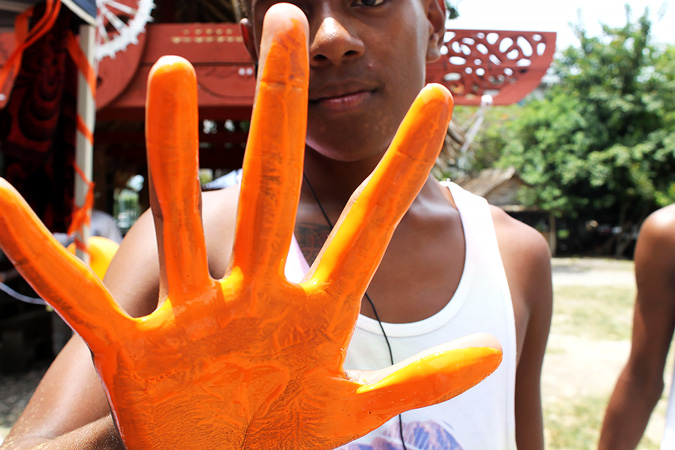Ending violence against women toolkit first of its kind in the Pacific
Date:
Suva, Fiji - Are’tiki is like many other Pacific towns and villages. Women face a number of challenges including fewer educational and economic opportunities, limited access to reproductive health services, poor representation in decision-making and high rates of violence. But when Are’tiki Women’s Association Programme Officer, Moana, found out that the rape of a young woman by her boyfriend was not an isolated incident, she decided to do something about it.

Her idea was to design a project that promoted safe and respectful relationships between young people in her community. The problem was, she wasn’t sure where to start; how to design and implement a project, or where to source funding for it.
Moana, her organisation and the community of Are’tiki are fictional, but the challenges she faces in getting her project off the ground are similar to those faced by activists and organisations around the Pacific as they work to end violence against women and girls in the region. A series of prevalence studies conducted in countries across the Pacific shows that two in three women experience some type of violence in their lifetime, mostly from their partners or husbands, a figure that is twice the global average.
Moana’s story is woven through a new toolkit launched on Thursday July 23 by UN Women, providing an evolving case study that helps to guide readers through the steps needed to create and implement effective projects to make a meaningful difference on the ground for women and girls, as well as secure the funding needed to make them sustainable.
The toolkit, titled “How to design projects to end violence against women and girls”, is the first of its kind in the Pacific. It has been developed by UN Women through its Pacific Regional Ending Violence against Women Facility Fund (Pacific Fund), with funding from the Australian Government.
Designed to be as practical and user-friendly as possible, the toolkit is a step-by-step guide to every stage of the project cycle – from basic concepts such as gender, human rights and project design through to needs assessments, workplans, data collection, media outreach, stakeholder relationships and monitoring and evaluation techniques. It incorporates a number of group activities, tips, templates and online resources, as well as a list of potential funding sources.
UN Women’s Representative at the Fiji Multi-Country Office in Suva, Aleta Miller, says the toolkit has been developed to provide organisations with a resource that supports them on some of the more technical aspects of project planning, design, implementation and evaluation that are required by donors.
“There is no shortage of passion, ideas, knowledge and understanding when it comes to ending violence against women and girls in Pacific communities. This toolkit is designed to help transform that passion and knowledge into realistic and effective projects that a donor can be excited about and confident to fund. All of which will take us that much closer to our ultimate goal of ensuring that every woman and girl in the Pacific can live a life free from violence.”
The Australian Government is a major funding partner in the Pacific and the Australian High Commissioner to Fiji, Margaret Twomey, says that organisations of all sizes and levels can benefit from the toolkit.
“Pacific Island governments and civil society organisations find it difficult to access funding, resources and the capacity to design and carry out projects that address violence against women. This toolkit contains hands-on, user-friendly content that can help organisations develop and carry out projects effectively in the various contexts they work in.”UN Women’s Pacific Fund provides grants of up to USD100,000 and extensive capacity building support to government departments and civil society organisations for projects working specifically towards ending violence against women and girls in the region. Funded by the Australian Government, the Pacific Fund has to date authorised 42 grants across seven countries for a total of more than USD1.7 million.
“How to design projects to end violence against women and girls: a step-by-step guide to taking action” is now available for download, free of charge: http://bit.do/7u35
Media enquiries should be directed to
Ellie van Baaren
Regional communications and media specialist, UN Women
Phone: (+679) 330 1178 ext 125
Email: [ Click to reveal ]
Sereana Narayan
Communications Associate, UN Women
Phone: (+679) 330 1178 ext 120
Email: [ Click to reveal ]
For further information visit:
asiapacific.unwomen.org/en/countries/fiji
www.facebook.com/unwomenpacific
www.twitter.com/unwomenpacific
BACKGROUND INFORMATION
About UN Women and the Multi-Country Office (MCO) in Fiji
The United Nations Entity for Gender Equality and the Empowerment of Women (UN Women) was created at the July 2010 United Nations General Assembly. A global champion for women and girls, UN Women was established to accelerate progress on meeting their needs worldwide. The MCO covers 14 Pacific Island Countries and Territories (PICTs): Cook Islands, Federated States of Micronesia, Fiji, Kiribati, Nauru, Niue, Palau, Republic of Marshall Islands, Samoa, Solomon Islands, Tokelau, Tonga, Tuvalu and Vanuatu. The Fiji MCO works through four key programmes: Women’s Economic Empowerment; Ending Violence Against Women; Advancing Gender Justice in the Pacific; and Increasing Community Resilience through Empowerment of Women to Address Climate Change and Natural Hazards Programme to progress with gender equality and women’s empowerment in the Pacific.